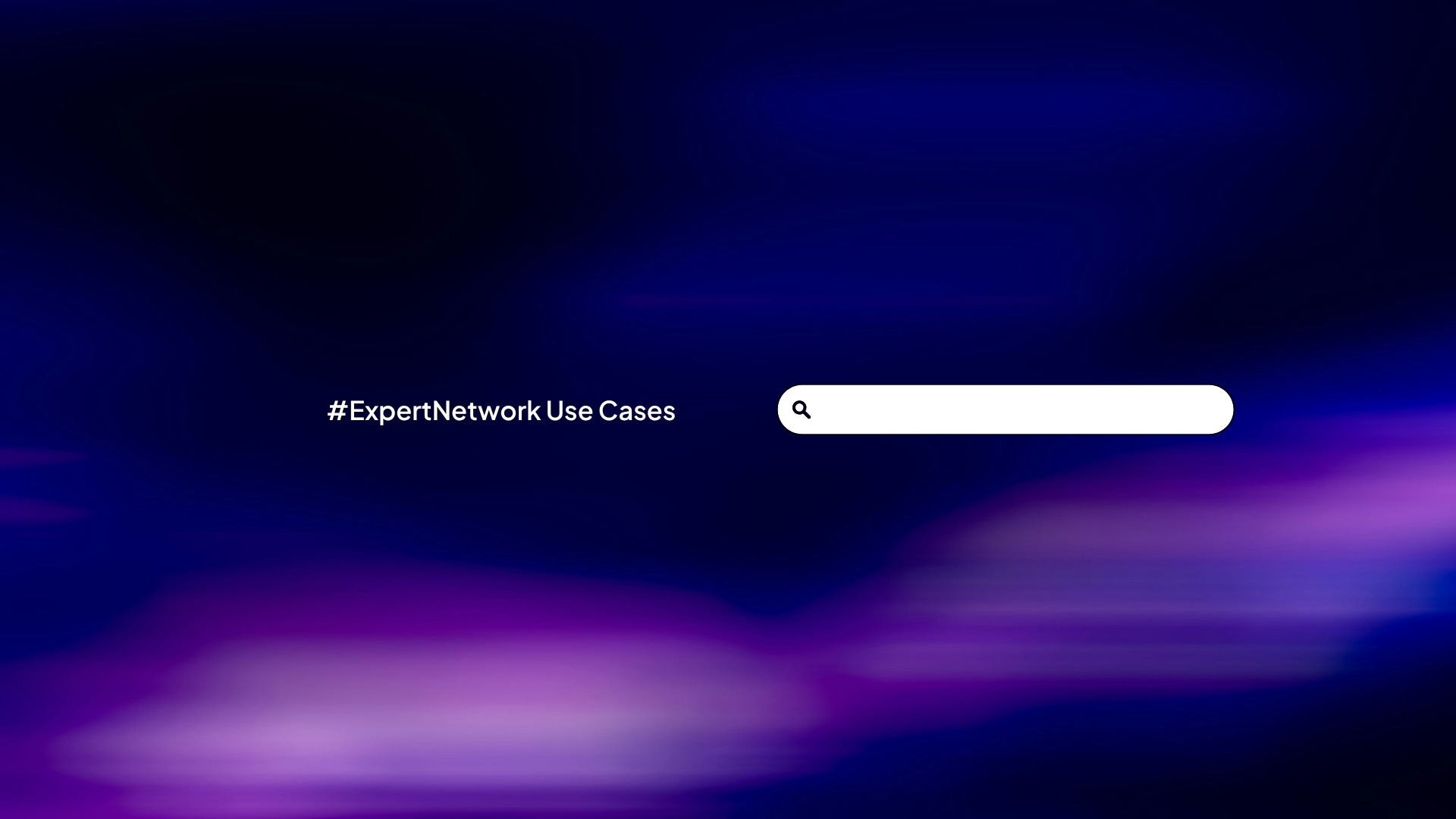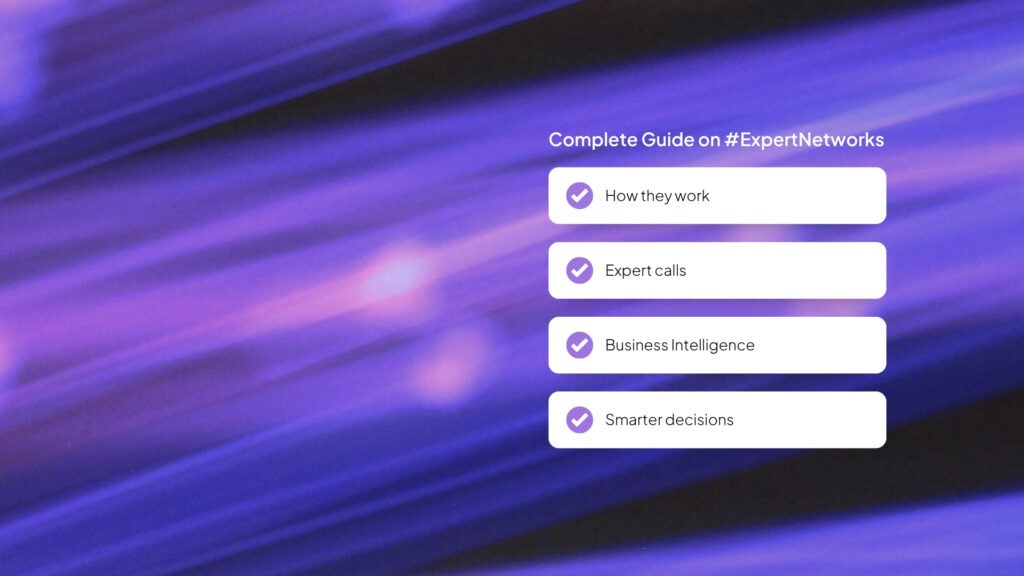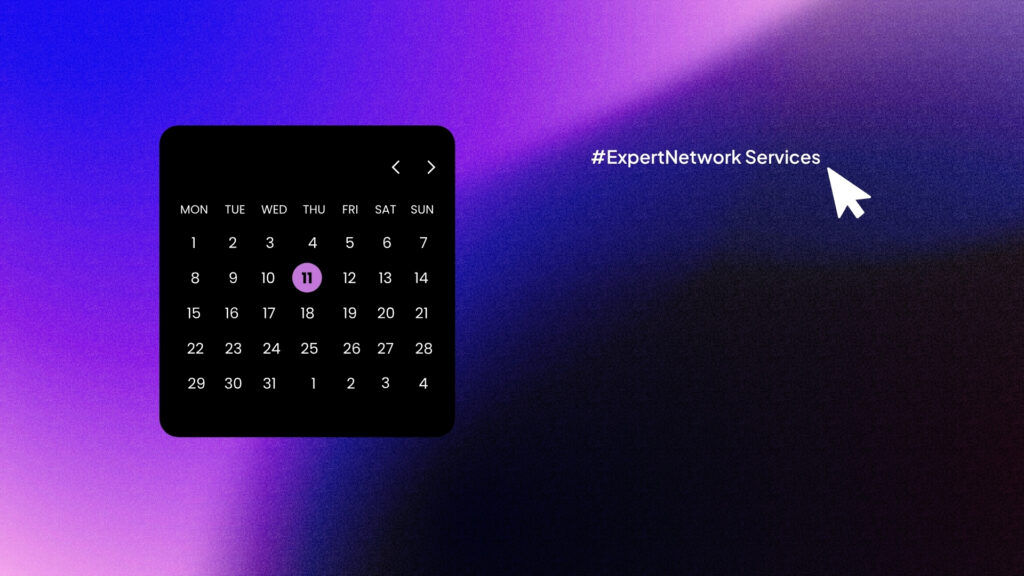These networks are invaluable when internal resources fall short, helping consulting firms assess markets, investment teams conduct due diligence, and corporates validate product or regional strategies.
Learn more about what expert networks are and how they work.
This article breaks down the right time to use expert networks, the top use cases, and how to choose the right provider.
Recognizing the Right Time to Use Expert Networks
The right timing is everything. These information providers deliver the most value when you face knowledge gaps, urgent timelines, or complex decisions.
When Internal Teams Can’t Fill Knowledge Gaps
Use expert networks when entering new markets, exploring emerging technologies, or evaluating investment opportunities. They provide on-demand access to verified specialists with firsthand experience, closing research gaps that would take months to solve internally.
When Speed and Accuracy Are Critical
When timing matters, traditional research is too slow. Expert networks can connect you with qualified experts within hours, letting you move fast and make informed choices without compromising accuracy.
When Objectivity Is Needed
External experts provide an unbiased perspective, highlighting risks or blind spots that internal teams might overlook due to organizational bias or politics.
Top Use Cases for Expert Networks
These platforms help businesses make better, faster, and more confident decisions across industries. The sector is projected to reach $10.78 billion by 2032, growing at 16% annually.
Explore the different types of expert network services available and how they meet specific business needs.

1. Market Entry and Expansion
Companies entering unfamiliar regions rely on local experts for insights into regulations, customer behavior, and competitors, enabling more precise market strategies.
2. Product Development
Product and R&D teams use experts to validate concepts, refine features, and avoid costly mistakes before launch.
3. Competitive Intelligence
Accessing insights from former executives or industry insiders helps companies understand competitor pricing, positioning, and strategy. 73% of organizations using competitive intelligence report stronger decision-making outcomes.
4. Regulatory and Compliance Projects
Firms consult former regulators, legal experts, and compliance officers to navigate complex frameworks and mitigate risks before expansion or investment.
Consulting firms and small businesses equally benefit from them as well. Consultancies rely on expert networks to fill knowledge gaps quickly, while SMEs gain access to top-tier expertise they couldn’t otherwise afford.
Don’t see your use case?
Contact UsChoosing and Engaging the Right Expert Network
Key Evaluation Criteria
When selecting an expert network, assess the following:
- Industry Focus: Choose networks with proven experience in your sector.
- Vetting Process: Confirm that experts undergo detailed background checks and screening.
- Compliance: Look for strict confidentiality and non-disclosure standards.
- Pricing Model: Understand whether fees are per-call or subscription-based.
- Response Time: Leading networks deliver qualified experts within 24–72 hours.
How to Prepare for Expert Network Calls
Maximize your ROI by:
- Defining clear research questions.
- Listening actively during calls.
- Documenting key takeaways.
- Integrating insights into decision frameworks.
Also, review contract details carefully, including time limits and transcription costs, to avoid hidden fees.
Conclusion
Expert networks have become indispensable tools for organizations navigating fast-changing markets.
They add the most value when businesses face knowledge gaps, tight deadlines, or complex strategic decisions that require independent expertise.
From financial institutions and consulting firms to SMEs, these networks enable smarter decisions backed by credible insights, a necessity in an economy driven by information speed and precision.
FAQs
Q1. What are expert networks, and when should businesses use them?
They connect businesses with vetted specialists for strategic insights. They’re most valuable when companies face knowledge gaps or urgent decisions.
Q2. How do expert networks benefit financial institutions?
Private equity and hedge funds use them for due diligence, market research, and investment validation.
Q3. Can small businesses benefit?
Yes, SMEs access affordable expert consultations for growth and operational improvements without full-time hires.
Q4. What should companies consider when choosing a network?
Key factors include industry specialization, vetting process, compliance, pricing, and response speed.
Q5. How can businesses maximize expert calls?
Prepare specific questions, take notes, and apply insights directly to strategy and operations.


